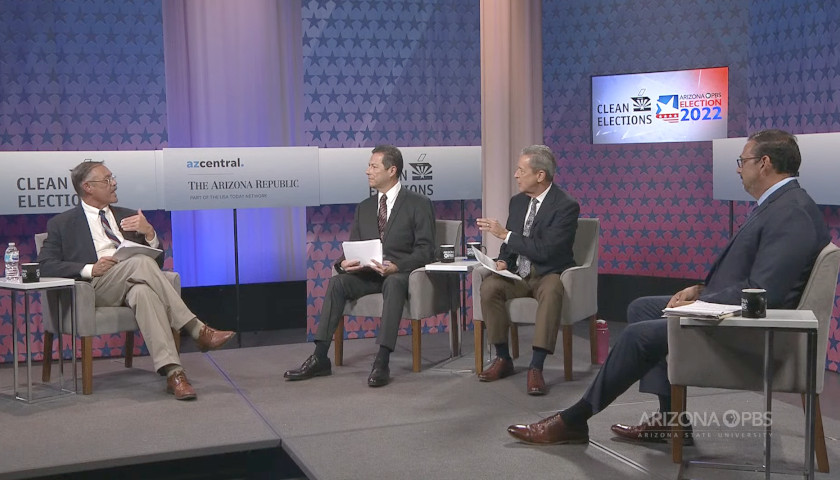Trump-endorsed State Representative Mark Finchem (R-Oro Valley) faced off against Democratic former Maricopa County Recorder Adrian Fontes in a debate Thursday evening hosted by the Arizona Citizens Clean Elections Commission on KAET PBS. Most of the lively exchange focused on the candidates’ stark differences regarding voter fraud, with Fontes more dismissive and Finchem stating election integrity is a priority.
Finchem said in his opening statement that he is running due to what’s happened to the office under the current officeholder, Democratic Secretary of State Katie Hobbs, who is running for governor. He said he wants to “restore honor, integrity, and security” to the position. “It’s not up to the secretary of state to make the law, they enforce the law that’s already laid down.” In addition to other controversies, Hobbs has been involved in a high-profile legal dispute with Arizona Attorney General Mark Brnovich for making changes to the state’s Election Procedures Manual that Brnovich asserts are outside her authority.
Fontes said he’s running because “democracy is a decision.” He implied that Finchem would usher in an era of “conspiracies that lead to corruption and chaos.” Even though the secretary of state position does not deal with abortion, he went off on a rant about how his three daughters “deserve to make their own choices” and said he would discuss it further into the debate (which he did not). Democrats have made the Supreme Court’s Roe v. Wade reversal a central issue for the midterm elections.
Moderator Ted Simons asked the candidates if they would have certified the 2020 presidential election in Arizona. Finchem responded and said “there are too many hypothetical questions” to answer the question, pointing out that “we didn’t know” about a lot of the issues until “after the certification had occurred.” However, “Knowing what we know today, certain counties’ results should have been set aside like Maricopa and Yuma,” there were “so many votes outside of the law.”
Finchem referred to the ballot harvesting scandal in Yuma, where two people, including the former mayor of San Luis, pleaded guilty to the class 6 felony. The documentary 2,000 Mules featured a whistleblower from that operation.
Fontes responded to the question by referring to democracy again. “We have to look at our common value, faith in our democracy,” Fontes said.
He added Finchem was referring to “conspiracy theories and lies” in his answer. He said “divisiveness not based in facts or evidence” is “dangerous for America.”
Finchem said, “I take exception, he’s running over the evidence that’s been presented.”
He cited the evidence of “people stuffing ballots” in 2,000 Mules, backed up by “two terabytes of information.”
He said the two defendants who pleaded guilty in Yuma “are not fiction, that’s fact.”
Simons told Finchem there hasn’t been any evidence produced to overturn an election, and Finchem responded by correcting him, “I’m not talking about overturning an election, I’m talking about one county that is compromised.”
He said, “If an election is mismanaged, what remedy do the people have?”
Fontes responded, “The answer is the rule of law and the constitution, court filings challenging outcome of races.” He complained about concerns of voter fraud, “We have an entire set of fiction that has made a lot of money for people outside the regular norms.” He said, “We need predictability,” saying “it’s time we moved away from 2020.”
Finchem rebutted this by bringing up an article in The Arizona Republic from September 2020 by Abe Kwok, which referred to Fontes’ term in office containing some “dramatically bad moments.” He cited the second article from The Republic in March 2020 by columnist Laurie Roberts, titled, “Adrian Fontes is making up election law as he goes along. This won’t end well.”
Finchem continued to recite more from the second article, including Roberts’ comment about Fontes mailing unsolicited ballots to voters, which was stopped by a judge. “And isn’t that a frightening thought?” she asked. “That the guy in charge of elections can do as he pleases as long as there’s no prohibition in the law?”
Finchem said, “He just said we need to build confidence. I agree. We need one who will follow the law instead of making it up as we go along.”
Fontes retorted by accusing Finchem of being part of the “violent insurrection” on January 6, asserting that Finchem would “overthrow the government.” He said Finchem has an “unhinged and violent aspect” and advocates for “stockpiling weapons.”
Fontes defended his attempt to send mass unsolicited ballots to voters in 2020, which cost taxpayers over $100,000. “At the outset of the pandemic, people were afraid to leave their homes,” he said. “My opportunity to send ballots was on the side of the voters, not on the side of some prohibition that didn’t exist at the time.”
Finchem interjected and said that was “total fiction,” the “creation of something that didn’t exist.” He explained that he was interviewed as a witness for January 6, “I’m not a criminal, he is,” referencing Fontes’ run-ins with the police in previous years involving felony charges for endangerment, unlawful flight from police, and alcohol/marijuana use as a minor.
Finchem explained how the discrepancies in the 2020 election are still under scrutiny. “I had a book of evidence,” he said. “We’re still looking. Over 1,000 ballot images don’t have a stamp. how did that happen?”
Simons asked Finchem why investigators have found no evidence of widespread voter fraud, and Finchem disputed this characterization, pointing out that the lawsuit with evidence that he filed with Arizona gubernatorial candidate Kari Lake has not been thrown out; it’s on appeal with the Ninth Circuit Court of Appeals over a standing issue.
Fontes accused Finchem of only being concerned about voter fraud in 2020 since his candidate Donald Trump lost. He said Finchem is “politically motivated” and causing “political instability.” He emphasized that elections need “stability,” asserting, “It’s not our fault that he can’t accept one loss.”
Finchem retorted by showing Fontes’ lack of stability during the 2018 primary election, when 62 precincts “experienced significant issues and weren’t able to open on time,” as well as printing problems at some locations leaving voters without ballots. “The polls should be open when they’re supposed to be open,” Finchem said. “They should have ink in the printers. He was unable to do that in a county election. How does that manifest itself statewide?”
Moderator Richard Ruelas asked the candidates what role the federal government should have in Arizona’s elections. Finchem responded, “I think the federal government needs to butt out of states’ rights. It is the legislature who names the time, place and manner of an election, not the federal government.” He said, “We hear from Democrats that the elections were fine, perfect, yet they want to run HR 1 through Congress. Unable to get it passed, they tried to pass it at the state level.”
Fontes disagreed, stating, “Congress plays a significant role in our elections.” He accused Finchem of “wanting to take freedoms away,” attacking Finchem’s concerns about mail-in voting.
Stevens asked Finchem if he wanted to get rid of mail-in voting, and he responded, “My mindset doesn’t matter, it’s not up to the secretary of state to write law, and that is exactly what the current secretary of state and Fontes have tried to do.” Finchem praised the absentee ballot program in Tennessee, which requires a valid reason to vote by mail, unlike Arizona’s system, where no excuse is necessary.
Simons next asked the candidates if voters wanted an election chief who participated in a riot to overturn the government, a dig at Finchem. Finchem responded, “The last time I checked, the fact someone was at the location of a riot is not illegal. I was a witness.” Finchem, a former police officer, said he’s a member of the Fraternal Organization of Police and the Constitutional Sheriffs and Police Officers Association. He explained his role on January 6, “I was there to deliver an evidence book to two congressional members in the well of the senate when they went to argue question and controversy.”
Ruelas asked the candidates how important are the state’s archives, especially considering the current legal dispute involving Trump and the National Archives. Finchem said he wants to see the current 22-month requirement to save election records expanded to 10 years.
Fontes said he was grateful to Mormons for preserving his family history so he could trace it back to the 1690s. He criticized the current administration, “This legacy we have in Arizona is in jeopardy due to how the records are being kept.”
Fontes concluded with his theme of democracy. “Democracy is a decision, as you’ve seen tonight. That decision could be no more clear; community building and stability” versus “conspiracy theories” and “violence.”
Finchem wrapped up his remarks by stating he was “passionate about protecting your suffrage.” He referenced Roberts’ article stating that Fontes is “making up election law as he goes along,” stating that in contrast, “my job is to see that everyone follows the law.”
A new poll from The Trafalgar Group shows Finchem more than six points ahead of Fontes.
– – –
Rachel Alexander is a reporter at The Arizona Sun Times and The Star News Network. Follow Rachel on Twitter. Email tips to [email protected].
Photo “Arizona Secretary of State Debate” by Arizona PBS.






[…] ran on a platform championing election integrity, in contrast to Fontes, who was stopped by a judge from mass mailing ballots to voters who hadn’t requested […]
[…] ran on a platform championing election integrity, in contrast to Fontes, who was stopped by a judge from mass mailing ballots to voters who hadn’t requested […]
Fontes: repeat after me. “Our form of government is NOT democracy, it’s a representative republic based upon the C. onstitution. When you repeat the democrats line du jour, you tell me two things: you are in lock step with the fascists, and you aren’t smart enough to differentiate the difference between rule by the mob, and the Rule of Law. I wouldn’t vote for you for a million dollar bribe!